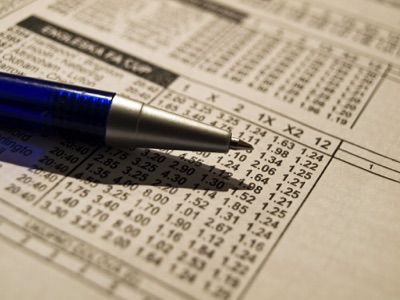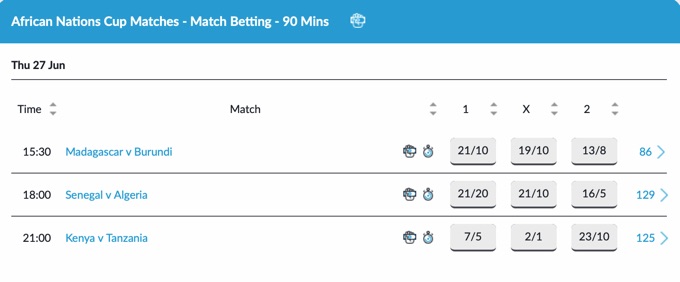 In footballing terms, Match Betting is probably the bet type that is easiest to understand. To put it simply, you’re betting on whether the home team will win, the away team will or that the match will end in a draw.
In footballing terms, Match Betting is probably the bet type that is easiest to understand. To put it simply, you’re betting on whether the home team will win, the away team will or that the match will end in a draw.
You’ll sometimes see this expressed as 1X2, with 1 being the home team, X being the draw and 2 being the away side. I’ll explain it all in a bit more detail here, but they’re the salient points you need to know from the off. At a bookmaker’s website it will look like this:

Variations on Format
One thing worth noting is that not all bookies use the 1X2 formula, with Ladbrokes being an example of one that likes to do things in their own way and have opted for HDA to signify Home, Draw and Away. Even so, the layout is the same and it means the same thing. Underneath each column you can see the odds for each outcome, with Madagascar being 21/10 to win in the first match above, Burundi 13/8 and the draw coming in at 19/10.
You can also sometimes see the clubs involved listed in order, so it would look something like this, for example:
- Tottenham Hotspur (4/3)
- Draw (5/2)
- Burnley (3/1)
Whichever way it’s written, though, the key thing to remember is that the order will always see the home team first and the away team last, sandwiched either side of the draw. You’ll also see the odds next to the options available. A bet on Spurs, therefore, is the equivalent of a bet on 1 or a bet on H with a regular bookie or Ladbrokes. You think Tottenham will win and will paid at odds of 4/3 in my made up example if they do.
It’s a 90-Minute Bet

One of the most crucial things to remember is that the bet is placed on the result at the end of 90 minutes of football. That includes stoppage time, but it doesn’t include extra-time or penalties if you’re betting on a cup game.
I’ll come on to talk about that in a minute, but right now the only thing you need to repeat like a mantra if you’ve not done Match Betting before is that when the referee blows full-time on a game, the score as it is at that moment is what bookmakers will pay out on.
Norway Women V England Women Example
Let’s say, for example, that you’re betting on the match that took place between Norway Women and England Women in the Women’s World Cup quarter-final. If you went to the Ladbrokes site you’ll see that it would look like this:

Because it’s a knockout tie there’a a chance that it could go to extra-time or penalties, but you bet wouldn’t include such a possibility. A Bet on Norway would mean that you think they’ll be ahead at full-time, a bet on England will mean you think the Lionesses will be and a bet on the draw means that you don’t think there’ll be anything between them come full-time.
One thing that’s worth point out at this juncture is that teams are still assigned a home or away designation in cup matches, even though the games are normally played at a neutral ground. This is because they might both have the same ‘home’ strip and therefore one needs to know that they’ll have to wear their away kit for the game. That’s why it’s important to remember that the home side is always listed first in the 1X2 format.
How Do Cup Matches Work?
You might think that the match between Norway and England’s Women teams will end in a draw but that the Lionesses will ultimately prevail in the tie. If that’s the case then you’ll want to keep your eye out for the ‘To Qualify’ market. That is a bet on the team that you think will make it to the next round of the cup or tournament, regardless of the betting at the end of the 90 minutes. It looks like this:

You’ll note that the odds are different, too. That’s because the third possibility of the draw has been removed, taking away some of the bookmaker’s edge. After all, if they game ended in 90 minutes as a draw then the bookies would win all bets placed on the home and away teams, so they need to do something to make up for that lost revenue.
Bear in mind when it comes to betting on cup competitions that there are many variations on the same theme. What I mean by that is that some tournaments, such as the knockout stages of the Champions League, are based over two-legs and so you can get involved with Match Betting twice: once for the first leg and then again for the second. The ‘To Qualify’ bet covers the overall tie.
It’s interesting to remember that the odds will change between the start of the tie and the kick-off for the second-leg, depending on how the first-leg has panned out. When Liverpool lost 3-0 away to Barcelona in the Champions League campaign in the 2018-2019 season, as an example, the odds on the English side qualifying would have been extremely high before kick-off. If you’d decided to take a punt on them you’d have been very happy, though, with the reds winning the second-leg 4-0.
That’s the sort of thing worth thinking about when you’re looking to place your Match Betting wagers. I’m not suggesting that you should always bet on lost causes, but in the example of Liverpool and Barcelona you’d have been able to get reasonable odds on Liverpool winning the second-leg because that was a one-off match, but the chance of them winning the overall tie would have been seen as astronomical because they needed to score four goals without reply against a team containing Lionel Messi and Luis Suarez. Betting on the reds to win the match wouldn’t have a huge amount of value when compared to a bet on them winning the tie.
Things to Think About Before Betting

If you’re thinking of placing a Match Betting wager then there are several things you’ll want to think about before you do. I’m a big believer in doing your research before you place a bet and it’s just as applicable when betting on football as it is on horse racing. After all, you wouldn’t splurge a load of money on a horse without first having had a look at its form, whether it likes the course that it’s running on and whether or not it’s had a running battle with one of the other horses in the race that it’s often been on the losing side of.
It’s just the same when it comes to football betting. Teams have form, they have bogey sides that they don’t like to play against and they have referees that they don’t seem to get on all that well with. Some teams can be excellent at home and terrible on the road, for example, whilst others will operate in the opposite manner. The idea of bogey teams or, at the very least, grounds that clubs don’t like travelling to is a very real thing, too.
Bogey Teams Are Real
Prior to the 2018-2019 season, for example, Everton hadn’t beaten Liverpool at the latter’s home ground of Anfield since 1996. Which team would you bet on before kick-off? If you think that every run has to come to an end at some point then obviously you’d have opted for the blue side of Merseyside, but if you think that form and bogey teams are real then you’d doubtless have predicted another win for the home team.
Those of you that would opt for Liverpool would’ve been right, with the match looking as though it was going to end in a draw before Everton’s goalkeeper, Jordan Pickford, inexplicably decided to keep the ball in as it looked as though it was going out of play, allowing Liverpool’s striker, Divock Origi, a simple tap-in for the winner in the 96th minute of the game.
Injuries Can Change Matches
As I’ve already said, doing your research is crucial when you’re betting on football matches. The likes of Instagram and Twitter can be perfect for bettors because there aren’t really any rules in place to stop players from sending social media posts that reveal that they won’t be playing in an upcoming match.
If you follow players on social media and track their posts then you’ll soon find out if they’ve posted something that gives you a clue about whether they’re going to appear in an upcoming match or not. Reacting quickly to such circumstances can sometimes give you an edge over bookmakers as you might be able to get your bet on before the markets have had a chance to react.
If you’re really hot on things then you’ll make a note of the match being played before the one that you want to bet on and keep an eye on how it plays out in case there are any injuries mid-game, betting on it appropriately. You can also respond to injuries as they happen if you bet on the In-Play market, too. Obviously it’s worth looking out for key players, but sometimes players that don’t normally play all that well can be influential during a match.
Other Match Betting Wagers
Whilst the 1X2 market is the clearest and most obvious one to bet on when it comes to Match Betting, it’s not the only market that you’ll want to look out for. Here are some of the other bet types worth thinking about that come under the umbrella of Match Betting:
Half-Time / Full-Time
Teams sometimes have a reputation for coming from behind to win matches. When Alex Ferguson was Manchester United manager, for example, the notion of ‘Fergie Time’ was a well-established one, with the idea being that the Red Devils would often score during stoppage time at the end of matches to win them at the opposition’s expense. If you feel as though one of the teams you’re betting on might do something similar then you can look out for the Half-Time / Full-Time market, which looks like this:

The first thing in the bet is the half-time score, the second thing is the full-time one. So a bet on ‘Draw – Manchester United’ at 19/4 means that you think the scores will be level at half-time but that Manchester United will win the game overall. Once again, this is a 90 minute bet.
Draw No Bet
Betting on the Draw No Bet market is a decent way to cut out the possibility that you’ll lose your bet if the match you’re looking at ends in a draw. The idea here is that bets on the home or away win are made void if the game ends without either time taking home the victory. It looks like this:

The main thing to note is that the odds are different because the bookmaker’s edge that comes with the draw option has been taken away. It means that you’re getting 3/5 on Manchester United to win rather than 5/4 in the straight Match Betting market.
Win From Behind
Some bookmakers will offer a Win From Behind market, which is exactly what it sounds like. Do you think one of the two teams involved in the match will win it despite going behind early in the game? If so then this is the market for you.

If you’re thinking of placing a bet on it then do remember that you’re really placing several bets all at the same time. You’re essentially betting yes on the Both Teams To Score Market, and that there will be an outright match winner. It might be worth exploring whether you can Request-A-Bet with all of those outcomes in a mini-accumulator to see if the odds are any better.
You’ll also note that there’s an option to bet on either of the teams coming from behind to win. If you think there’ll definitely be a winner and that both teams will definitely score but you’re not sure which way the game will ultimately go then this is the option to plump for.
Double Chance
Double Chance is a great bet for those fence sitters amongst you. In essence it is a bet that means you don’t have to make a definitive decision about anything, instead choosing the two most likely options that you think will happen and betting on that.
Sometimes matches are too close to call and you’re just not sure which way the chips are going to fall when it’s all over and done with. If you’re looking at one of those games then make sure you check out the Double Chance market to see if the odds are any good. Of course, a bet on Manchester United / Draw in the Double Chance market of the game we’re looking at will have lower odds than either outcome on its own.

The bet is typically broken down into three options:
- Home Win or Draw
- Home Win or Away Win
- Away Win or Draw
You will win your bet if either of the outcomes in your selection happens, but your payout will be lower than if you’d opted for the outright result on its own. I like to think of this as the superstitious bet. Personally, I’m always slightly averse to betting on my own team winning even if they’re overwhelming favourites, so I’ll opt for the option that sees me winning money it’s a draw or the opposition wins. My advice would be, don’t be like me!
